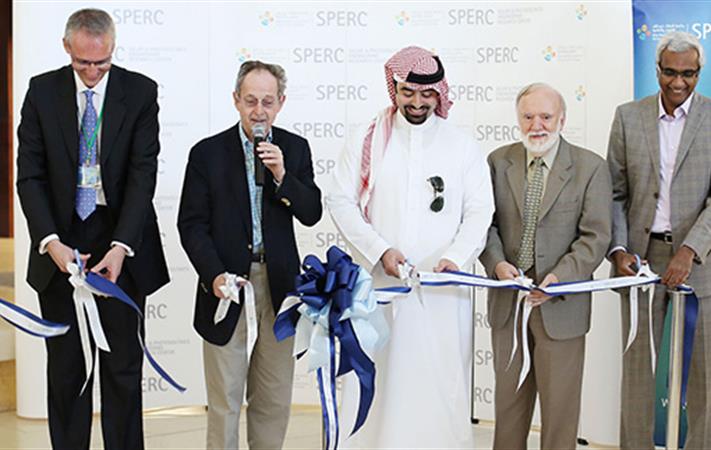KAUST Solar Center officially inaugurated

The Solar & Photovoltaics Engineering Research Center (SPERC) was recently officially inaugurated with a two-day seminar on April 27 and 28 that featured international solar energy experts.
“It’s obvious that solar energy has a major potential for the Kingdom,” said Prof. Karl Leo, Director of the recently inaugurated Solar & Photovoltaics Engineering Research Center (SPERC). Last month’s inauguration and two-day seminar brought together some of the world’s top leaders in solar energy. Underlying the importance of combining basic research with an application-led industry focus, Prof. Leo expounded: “The message I want to transmit with this inauguration is that the solar center is about basic research but it’s also closely working with Economic Development. KAUST should become the hot spot in renewables and photovoltaics in the country and the region.”
The first day was more basic research-focused and concentrated on one specific photovoltaic technology, namely Copper Indium Diselenide (CIGS), representing a semiconductor material composed of copper, indium, gallium, and selenium. CIGS is an alternate solar cell material used in thin-film photovoltaic technology. It can effectively be deposited onto highly flexible substrates, making it possible to devise such things as lightweight solar panels.
On the second day, industry-focused meetings were held amongst representatives of some of the world’s leading companies in the field present at KAUST for the SPERC inauguration. The topics of discussion focused on how the solar energy manufacturing industry can be effectively developed in Saudi Arabia and also how the government can enact policies and intervene to speed up the process.
KAUST as a Global Hub of Solar Research
In addition to celebrating the opening of KAUST’s world-class laboratory facilities, the inauguration also resulted in a noteworthy memorandum of understanding between the University and the Stuttgart-based Centre for Solar Energy and Hydrogen Research Baden-Württemberg (ZSW) to develop thin-film photovoltaic technology. ZSW, represented at the inauguration by Prof. Michael Powalla, is the current world-record holder in thin-film photovoltaics cells efficiency -- recently achieving an efficiency rate of 20.8%. “Our first step will be to establish their world-record technology here at KAUST to be on par with them, and then move in new directions such as cells made from abundant materials” said Prof. Leo.
“When KAUST was founded it was clear that the solar center should be an important part of KAUST,” as Prof. Leo also recounts. Since the decision was made in 2010 to start building it, it has since developed extensively. Today, the center boasts 300 square meters of laboratory facilities including a large and well-equipped clean room lab, a laser lab, as well as a fine lab for thin film printing. “These labs were basically completed and commissioned last summer or fall; so now the Solar Center is picking up speed and we are also in the process of expanding faculty,” as Leo adds.
SPERC currently has seven faculty members, with three focusing mainly on photovoltaics. More faculty members are currently in the process of joining and active recruiting efforts are also bringing in new postdocs and research scientists. Given Saudi Arabia’s prime location for the study of solar energy, and the growing global interest in renewables, KAUST’s Solar Center is attracting a lot of international interest, including from potential students.
The Importance of Photovoltaics for the Kingdom
Due to the Kingdom’s rich resources in fossils, solar energy has not always been a central focus in Saudi Arabia, but “this has drastically changed” as Prof. Leo explained. He points to K.A. CARE, King Abdullah City for Atomic and Renewable Energy, as a clear sign of the government’s commitment to pushing forward with renewable energy and, as their mission states, to “building a sustainable future for Saudi Arabia.”
Speakers at the SPERC seminar demonstrated that if Saudi Arabia would produce its electricity by solar instead of burning oil and gas, the Kingdom would save a significant amount of money even today. The return on investment (ROI) would be positive and very high.
With his three decades of experience in photovolataics research and industry, Prof. Karl Leo said he was “very much impressed with how PV technology is taking off in the Kingdom.” There’s a growing number of local companies now preparing activities and manufacturing in the sector. Prof. Leo believes that this places KAUST’s Solar Center in a long-term trajectory of being at “the center in the Kingdom and the region on this topic.”
Looking ahead to SPERC’s short to long-term objectives, Prof. Leo explained that the short-term goal is to “concentrate on photovoltaics and all direct electricity generation from the sun.” In the mid to long-term range, however, the plan is to expand the center’s topics – mainly on energy storage and energy conservation. As he explains: “The biggest disadvantage of photovoltaics is that you can only generate energy as long as the sun is shining; but if it doesn’t shine you are limited. Therefore, in the long term, you need also storage technologies.”
Further Information
- Solar & Photovoltaics Engineering Research Center
- Announcement of memorandum of understanding between KAUST and ZSW
- SPERC Inauguration

